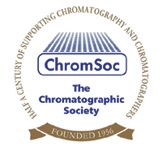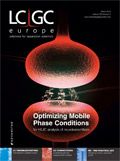Event News: Matrix Challenging Analytical Science Symposium
A panel of experts discuss the latest trends in sample preparaion.
The Matrix Challenging Analytical Science Symposium will take place on 22-23 May 2013 at the British American Tobacco (BAT) Research Labs, Southampton, UK.
An integral part of the symposium will be the Chromatographic Society (ChromSoc) AGM. ChromSoc is an internationally connected organization, and UK-registered charity, promoting and disseminating knowledge relating to all aspects of chromatography and related techniques. Another key feature of the symposium is the discussion of selected challenging, diverse and difficult-to-analyse matrices and analytes. Successful sample preparation methods and associated state-of-the-art instrumentation will be described by leading experts in their respective fields.

A number of special guest speakers have been invited to speak, including:
- Prof Jean-François Focant, University of Liege, Belgium: "Chasing Away the Smell of Death: GC×GC-TOF-MS Characterization of Cadaveric VOCs". This talk will illustrate recent advances in the characterization of human analogue decomposition VOCs using thermal desorption (TD) coupled to GC×GC and TOF-MS.
- Dr Jasper van Heemst, BAT R&D labs, Southampton, UK: "Application of GC/HRTOF for the Identification and Comparison of Tobacco Smoke constituents". GC×GC-TOF approaches have been explored for the separation and identification of components in tobacco smoke. Methods are being developed coupling GC to high-resolution time-of-flight mass spectrometry to enable comparison of chromatographic data from different tobacco smoke samples.
- Dr Peter Clayton, BAT R&D labs, Southampton, UK: "Estimation of Human Smoke Exposure by Chromatographic Analysis of Spent Cigarette Flter Extracts". This talk will explain the analytical measurements required to conduct the "filter analysis method" that allows the estimation of "tar" and nicotine yields obtained by individual smokers.
- Prof Dr Ralf Zimmermann, head of the Joint Mass Spectrometry Centre (JMSC), University of Rostock, Rostock, Germany, and Helmholtz Zentrum München, Neuherberg, Germany: "On-line Monitoring of Complex Mixtures by Photoionization Mass Spectrometry".
To encourage social networking between delegates, presenters and exhibitors, an evening social event will be organized in Southampton. BAT will offer a laboratory tour and open their specialist historical exhibition attraction to all attendees during the symposium.
The conference is targeted at laboratory, industrial and forensic analysts faced with problems of selectivity, specificity and sensitivity in matrices that are difficult to prepare and process, according to the organisers. Manufacturers of analytical instrumentation and scientists could also find the conference useful.
Registration fees include meals and refreshments supplied at the symposium. ChromSoc bursaries are available for bona-fide students to assist them in attending this symposium.
For information on lecture content contact Dr Chris Bevan at chris.anne.bevan@gmail.com For exhibition details contact Matthew Gilmour at: matthew@meetingmakers.co.uk
Website: www.chromsoc.com
16-20 June 2013
HPLC2013 Amsterdam
Amsterdam RAI Conference Centre, Amsterdam, The Netherlands
Co-chairs: Peter Schoenmakers and Wim Kok
E-mail: hplc2013@caos.nl
Website: www.hplc2013.org
1-4 July 2013
9th Annual Conference of the Metabolomics Society
Scottish Exhibition and Conference Centre (SECC), Glasgow, Scotland, UK
Organizers: Metabolomics Society
Tel: +44 (0)131 339 9235
E-mail: metabolomics@in-conference.org.uk
Website: www.metabolomics2013.org
28 July-2 August 2013
ICMGP International Conference on Mercury as a Global Pollutant
Edinburgh International Conference Centre, Edinburgh, Scotland, UK
Organizers: International Labmate Ltd
Tel: +44 (0)1727858840
Fax: +44 (0)1727840310
E-mail: david@mercury2013.com
Website: www.mercury2013.com
4–6 September 2013
9th Balaton Symposium on HighPerformance Separation Methods
Hotel Azúr, 2/C Erkel F. St, H-8600, Siófok, Hungary
Organizers: Hungarian Society for Separation Scientists
Tel: +36 30 894 0316
E-mail: hoholr@diamond-congress.hu
Website: www.balaton.mett.hu
6–9 October 2013
20th International Symposium on Electro- and Liquid-Phase Separation Techniques, ITP2013
Hotel Beatriz Atlantis & Spa, Tenerife, Canary Islands, Spain
Organizers: Spanish National Research Council and the University La Laguna
Tel: +34 922 318990
Fax: +34 922 318003
E-mail:itp2013@ull.es
Website: www.itp2013.ull.es
Send any event news to Kate Mosford kmosford@advanstar.com

Investigating 3D-Printable Stationary Phases in Liquid Chromatography
May 7th 20253D printing technology has potential in chromatography, but a major challenge is developing materials with both high porosity and robust mechanical properties. Recently, scientists compared the separation performances of eight different 3D printable stationary phases.
Detecting Hyper-Fast Chromatographic Peaks Using Ion Mobility Spectrometry
May 6th 2025Ion mobility spectrometers can detect trace compounds quickly, though they can face various issues with detecting certain peaks. University of Hannover scientists created a new system for resolving hyper-fast gas chromatography (GC) peaks.
University of Oklahoma and UC Davis Researchers Probe Lipidomic Profiles with RP-LC–HRMS/MS
May 6th 2025A joint study between the University of Oklahoma Health Sciences Center (Oklahoma City, Oklahoma) and the UC Davis West Coast Metabolomics Center (Davis, California) identified differentially regulated lipids in type 2 diabetes (T2D) and obesity through the application of reversed-phase liquid chromatography-accurate mass tandem mass spectrometry (RP-LC-accurate MS/MS).

.png&w=3840&q=75)

.png&w=3840&q=75)



.png&w=3840&q=75)



.png&w=3840&q=75)









